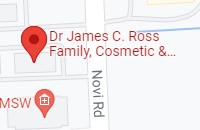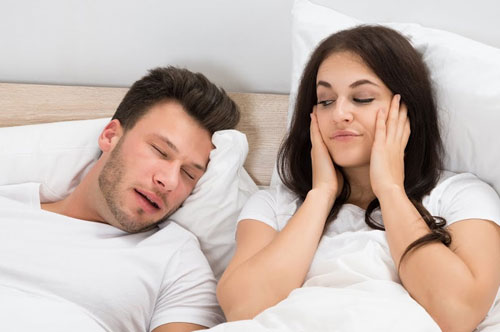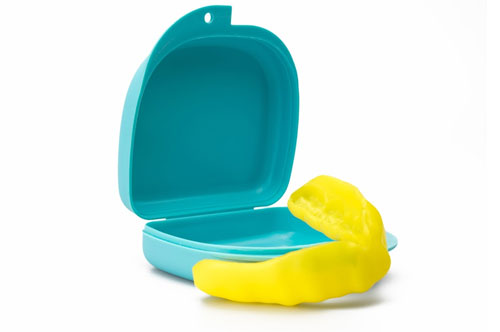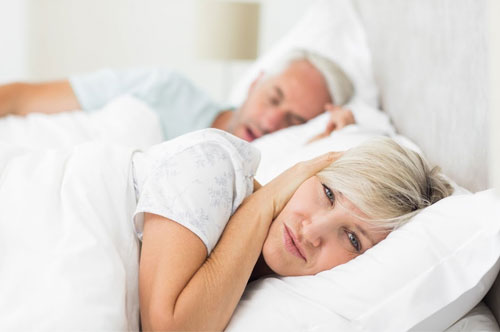Do you remember the last time you woke up feeling refreshed and rejuvenated? Can you remember a time when your family didn’t complain about or make fun of your snoring?
If not, then it may be time to schedule a visit to Dr. James Ross, Family, Cosmetic & Laser Dentistry. You could be suffering from sleep apnea — and if you are, then your family is probably suffering, too.
Dr. Ross offers a sleep apnea treatment in our Novi, MI dentist office that has helped many patients snore less and sleep better.
To find out if this could work for you, call 248-697-2487 to set up a consultation.
Sleep Apnea And Snoring
Please keep in mind the most people snore from time to time, so just because you snore, that doesn’t necessarily mean that you have sleep apnea.
However, loud and persistent snoring is one of the key symptoms that you have obstructive sleep apnea, which is the most common type of this sleep disorder.
When you have sleep apnea, you stop breathing when you fall asleep. Someone with mild sleep apnea may stop breathing up to 14 times every hour that he or she is asleep.
For someone with obstructive sleep apnea, this happens because his or her airways become blocked. Generally, this happens gradually. As you fall asleep, the muscles in your neck relax, and that allows soft tissues to block your airway.
Before your airway is completely closed off, however, the restricted opening amplifies the sound of your snoring. This can be as loud as a telephone ring (the old kind, not cell phones) or a vacuum cleaner.
Imagine trying to sleep next to someone who was constantly turning a vacuum cleaner on and off. This will give you an idea what your spouse or partner feels like try to sleep near you.
The reason the cycle happens is because your body will wake you up just enough to take a few breaths every time you stop breathing. Whether you remember this or not, it is affecting you while you are awake, too.
Sleep Apnea And Sleep Deprivation
People who get healthy sleep will go through multiple cycles of the stages of sleep each night.
Stages 1 and 2 are considered light sleep. This is when your body is starting to relax. Your breathing slows down, but you can be easily awakened during these stages.
Stage 3 is when deep sleep starts. Health experts believe this stage is vital for your overall health. This is the time when your body recovers from the stresses of the day.
REM sleep is the fourth stage. REM is short for rapid eye movement, and like Stage 3, this is considered part of deep sleep. This is the time when people dream.
When you are constantly waking up to breathe, you may have nights when you never reach the stages of deep sleep. As a result, you can wake up feeling fatigued. This is why daytime sleepiness is another common symptom of untreated sleep apnea.
This can cause you to feel like you are falling asleep sitting at your desk at work, sitting in your recliner watching your favorite team on television, or sitting behind the wheel of your car or truck. Statistically, people with sleep apnea are more than twice as likely to be in automobile accidents as other drivers.
Treating Sleep Apnea
Treating sleep apnea is about finding a way to keep your airway open. This will allow you to breathe continuously, so you can reach the stages of deep sleep. This will also reduce your snoring, so your family can sleep better, too.
Dr. Ross can help by creating an oral appliance just for you. In one sense, this is similar to a mouthguard that you wear while you sleep. The key difference is that this oral appliance shifts the position of your lower jaw.
Doing this makes it easier for your airways to remain open. When you can breathe, you can sleep longer. When you sleep longer, you feel more refreshed when you wake up in the morning.
Could an oral appliance help you or someone you love sleep better? To find out, schedule a consultation with Dr. Ross soon. Start by filling out our online form or by calling our office in Novi at 248-697-2487.
Visit Dr. James Ross
We can see you as soon as tomorrow!





